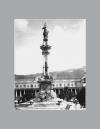Resumen
El Centenario de la Independencia fue la ocasión para revivir las glorias pasadas y testimoniar el papel que cumplieron los próceres en este hecho histórico; presentar al mundo ciudades renovadas, con nuevos proyectos urbanísticos, con modernos sistemas de alcantarillado e iluminación; disponer de fondos para iniciar otros proyectos arquitectónicos y concluir algunos planificados con antelación, incorporando, además, importantes obras escultóricas en el ornato de las mismas. La publicación de libros fue una de las preocupaciones de las Juntas conformadas para las celebraciones del Centenario, tema ineludible de estudio de los historiadores ecuatorianos, para exponer las razones por las cuales el Ecuador había dejado de ser parte del imperio español y había conformado un Estado independiente; explicar desde diferentes puntos de vista el porqué de la revolución y sus consecuencias, sucesos que pronto se comenzaron a sentir no sólo en el aspecto económico, sino en el ánimo de toda la población, sumándose otros factores como la devastación de las ciudades de la sierra a causa de los terremotos de 1859 y de 1868. Sin embargo, en las últimas décadas la visión histórica del siglo XIXcambió por la contribución de la "historia de las ideas" o "historia del pensamiento filosófico", lo cual ha permitido una mejor comprensión de este período, entendido como un hecho social y cultural inscrito en un contexto histórico particular, planteándose una relectura de todo el proceso, explicado a partir del contexto socioeconómico prevaleciente desde la segunda mitad del siglo XVIII.La revista Apuntes se encuentra registrada bajo la licencia Creative Commons Reconocimiento 4.0 Internacional. Por lo tanto, esta obra se puede reproducir, distribuir y comunicar públicamente en formato digital, siempre que se reconozca el nombre de los autores y a la Pontificia Universidad Javeriana. Se permite citar, adaptar, transformar, autoarchivar, republicar y crear a partir del material, para cualquier finalidad (incluso comercial), siempre que se reconozca adecuadamente la autoría, se proporcione un enlace a la obra original y se indique si se han realizado cambios. La Pontificia Universidad Javeriana no retiene los derechos sobre las obras publicadas y los contenidos son responsabilidad exclusiva de los autores, quienes conservan sus derechos morales, intelectuales, de privacidad y publicidad.
El aval sobre la intervención de la obra (revisión, corrección de estilo, traducción, diagramación) y su posterior divulgación se otorga mediante una licencia de uso y no a través de una cesión de derechos, lo que representa que la revista y la Pontificia Universidad Javeriana se eximen de cualquier responsabilidad que se pueda derivar de una mala práctica ética por parte de los autores. En consecuencia de la protección brindada por la licencia de uso, la revista no se encuentra en la obligación de publicar retractaciones o modificar la información ya publicada, a no ser que la errata surja del proceso de gestión editorial. La publicación de contenidos en esta revista no representa regalías para los contribuyentes.


